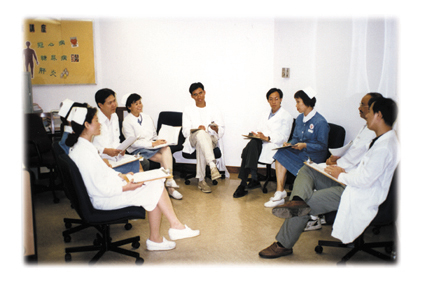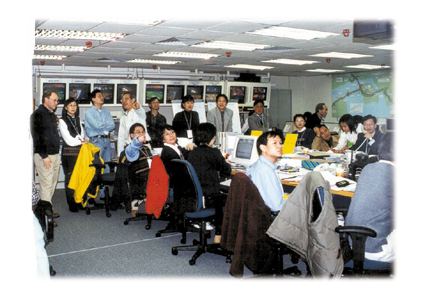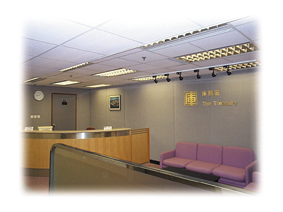|
|
|
As a result of the joint efforts of all Heads of Department and Heads of Grade, the total civil service establishment for 2000-01 will be reduced by 6 700. We are thus confident that we could achieve the target of a reduction by 10 000 by 2002-03 as announced in the 2000 Budget Speech. We believe the exercise in containing the size of the Civil Service has achieved the objective of maintaining a lean and fit civil service and giving an impetus to exploring with more innovative and effective ways of serving the public. Four Departments, namely Buildings Department, Department of health, Transport Department and Treasury, like to share with us in their own words their stories.Buildings DepartmentWe had been restless for several weeks. It was because any results which did not come 100% our way would mean a very hard time for us. It was a very tedious and painstaking exercise at all levels of the Buildings Department. After weeks of drilling and pressing, feedback from front-line to senior supervisory staff revealed that we could not afford to lose any single post in view of the tremendous backlog and new initiatives coming on stream. We, inter alia, have 800,000 unauthorised building works to clear! After much deliberation on our manpower plan, the senior directorate finally made a bold decision to submit an exceptional application for total retention of existing vacancies. We desperately need a substantial core of permanent staff to lead a huge complement of temporary staff in the coming few years. On 14 July, when we received the notification, it was a great surprise to us. To our amazement and delight, instead of being punched for non-conformance, we get what we applied for : 30 existing vacancies and 125 funded-posts. It reflects the considerateness, sensibleness and openness of the Joint Panel who really cares about the efficiency and operations of individual department.
The Department of Health has responded to the challenge of containing the civil service establishment positively. Building on the groundwork done since the introduction of the EPP, the Department has accomplished this endeavor with no adverse effect on the quality of services provided to the community. In coming up with its manpower plans, the Department has reviewed conscientiously its staffing requirement, taking account of the strategic plan, the scope for redeployment and alternative means of service provision. The key initiatives undertaken include reducing the staffing provision for some less busy clinics; redeploying existing manpower to meet new service demands; centralizing services through better networking; regrading certain posts which can be adequately taken up by junior rank staff; and outsourcing supporting services where they are more cost effective. The exercise stimulated ideas on new means of service delivery and staffing arrangements. It also heightened the awareness among staff that cost effectiveness was the key to survival be it in the private or the public sector. During the process, the Department maintained communication with staff and explained the impacts of the exercise, seeking their support and commitment. As a result of these efforts, a total of 478 posts, representing about 6.8% of the departmental establishment, will be deleted/given up. This will be achieved through natural wastage/staff redeployment without any redundancy. The resources thus released have enabled the Department to achieve the 5% EPP target in one go and to improve existing services using alternative means. This allows the Department some flexibility to deploy any further savings from other possible EPP reserve items to fund new initiatives/improvements. The review team led by the senior directorate will be an on-going mechanism. The Department will continue to encourage staff to sustain the culture of suggesting innovative means of service delivery and improvement.
A Steering Committee under the Commissioner for Transport was established in December 1998 to oversee the departmental Enhanced Productivity Programme. The Steering Committee supported by senior directorates saw the need for better management practice to enhance productivity, to implement new services and to improve existing services through efficient use of existing resources. On one hand, recognition is given to the need for a lean and fit workforce; and on the other hand, staff should be empowered with the tools and resources to respond to changes flexibly and to master challenges ahead. With the above guiding principles, we critically examined our manpower position and recommended a 6.3% reduction of establishment, i.e. 89 posts, by 2002-03 through natural wastage/redeployment. This was done by re-engineering office procedures and workflow, re-examining manpower needs and redeploying resources to meet TD's priorities. We took advantage of private sector participation by contracting out non-core activities and employing non-civil service contract staff, thereby allowing us to concentrate on core functions which could be provided more effectively. The whole process was indeed "painful and fruitful" involving efforts and understanding from both management and staff. To restrict the size of the establishment without adversely affecting the quality of service, one effective measure we deployed is to enhance staff morale and team spirit. Workshops and better management forums down to the frontline staff have been organized and since 1999 an annual staff perception survey has been launched to find out what our staff think of their job and the way in which TD manages them. Findings of the survey were reported at divisional levels with action plans developed to address areas of concern. This 2-way communication has generated momentum and consolidation among us to embark on a new way for TD. Besides "right-sizing" the organizational structure, we are mindful of the need to provide an enabling environment for our staff. Savings achieved are redirected towards creating the much needed posts in professional grades and for other purposes such as upgrading IT support, enhancing office equipment/furniture, implementing consultancy studies, hiring of services and launching counseling services etc. It is happy news for the department that the Joint CSB/FB Panel has given an exceptional approval to recruit Transport Officers and Engineers. The Panel's liberal and practical approach, giving due recognition to departmental achievement and needs, has helped the department to achieve targets. We have taken a hard look on ourselves to see how we could be in step with the increasing and changing expectations of the community. We pledge to continue to exercise close monitoring, take appropriate measures and to maintain good public service. We are thankful to the support given to us by the Resources and Policy Bureaux.
|
|
 Department
of Health
Department
of Health
 Transport
Department
Transport
Department
 Treasury
Treasury
